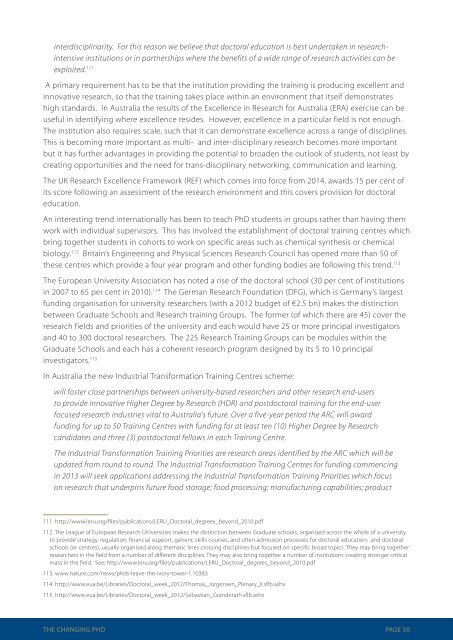the-changing-phd_final
the-changing-phd_final
the-changing-phd_final
Create successful ePaper yourself
Turn your PDF publications into a flip-book with our unique Google optimized e-Paper software.
interdisciplinarity. For this reason we believe that doctoral education is best undertaken in researchintensive<br />
institutions or in partnerships where <strong>the</strong> benefits of a wide range of research activities can be<br />
exploited. 111<br />
A primary requirement has to be that <strong>the</strong> institution providing <strong>the</strong> training is producing excellent and<br />
innovative research, so that <strong>the</strong> training takes place within an environment that itself demonstrates<br />
high standards. In Australia <strong>the</strong> results of <strong>the</strong> Excellence in Research for Australia (ERA) exercise can be<br />
useful in identifying where excellence resides. However, excellence in a particular field is not enough.<br />
The institution also requires scale, such that it can demonstrate excellence across a range of disciplines.<br />
This is becoming more important as multi- and inter-disciplinary research becomes more important<br />
but it has fur<strong>the</strong>r advantages in providing <strong>the</strong> potential to broaden <strong>the</strong> outlook of students, not least by<br />
creating opportunities and <strong>the</strong> need for trans-disciplinary networking, communication and learning.<br />
The UK Research Excellence Framework (REF) which comes into force from 2014, awards 15 per cent of<br />
its score following an assessment of <strong>the</strong> research environment and this covers provision for doctoral<br />
education.<br />
An interesting trend internationally has been to teach PhD students in groups ra<strong>the</strong>r than having <strong>the</strong>m<br />
work with individual supervisors. This has involved <strong>the</strong> establishment of doctoral training centres which<br />
bring toge<strong>the</strong>r students in cohorts to work on specific areas such as chemical syn<strong>the</strong>sis or chemical<br />
biology. 112 Britain’s Engineering and Physical Sciences Research Council has opened more than 50 of<br />
<strong>the</strong>se centres which provide a four year program and o<strong>the</strong>r funding bodies are following this trend. 113<br />
The European University Association has noted a rise of <strong>the</strong> doctoral school (30 per cent of institutions<br />
in 2007 to 65 per cent in 2010). 114 The German Research Foundation (DFG), which is Germany’s largest<br />
funding organisation for university researchers (with a 2012 budget of €2.5 bn) makes <strong>the</strong> distinction<br />
between Graduate Schools and Research training Groups. The former (of which <strong>the</strong>re are 45) cover <strong>the</strong><br />
research fields and priorities of <strong>the</strong> university and each would have 25 or more principal investigators<br />
and 40 to 300 doctoral researchers. The 225 Research Training Groups can be modules within <strong>the</strong><br />
Graduate Schools and each has a coherent research program designed by its 5 to 10 principal<br />
investigators. 115<br />
In Australia <strong>the</strong> new Industrial Transformation Training Centres scheme:<br />
will foster close partnerships between university-based researchers and o<strong>the</strong>r research end-users<br />
to provide innovative Higher Degree by Research (HDR) and postdoctoral training for <strong>the</strong> end-user<br />
focused research industries vital to Australia's future. Over a five-year period <strong>the</strong> ARC will award<br />
funding for up to 50 Training Centres with funding for at least ten (10) Higher Degree by Research<br />
candidates and three (3) postdoctoral fellows in each Training Centre.<br />
The Industrial Transformation Training Priorities are research areas identified by <strong>the</strong> ARC which will be<br />
updated from round to round. The Industrial Transformation Training Centres for funding commencing<br />
in 2013 will seek applications addressing <strong>the</strong> Industrial Transformation Training Priorities which focus<br />
on research that underpins future food storage; food processing; manufacturing capabilities; product<br />
111. http://www.leru.org/files/publications/LERU_Doctoral_degrees_beyond_2010.pdf<br />
112. The League of European Research Universities makes <strong>the</strong> distinction between Graduate schools, organised across <strong>the</strong> whole of a university<br />
to provide strategy, regulation, financial support, generic skills courses, and often admission processes for doctoral education; and doctoral<br />
schools (or centres), usually organised along <strong>the</strong>matic lines crossing disciplines but focused on specific broad topics. They may bring toge<strong>the</strong>r<br />
researchers in <strong>the</strong> field from a number of different disciplines. They may also bring toge<strong>the</strong>r a number of institutions creating stronger critical<br />
mass in <strong>the</strong> field. See: http://www.leru.org/files/publications/LERU_Doctoral_degrees_beyond_2010.pdf<br />
113. www.nature.com/news/<strong>phd</strong>s-leave-<strong>the</strong>-ivory-tower-1.10383<br />
114. http://www.eua.be/Libraries/Doctoral_week_2012/Thomas_Jorgensen_Plenary_II.sflb.ashx<br />
115. http://www.eua.be/Libraries/Doctoral_week_2012/Sebastian_Granderath.sflb.ashx<br />
THE CHANGING PHD PAGE 50


